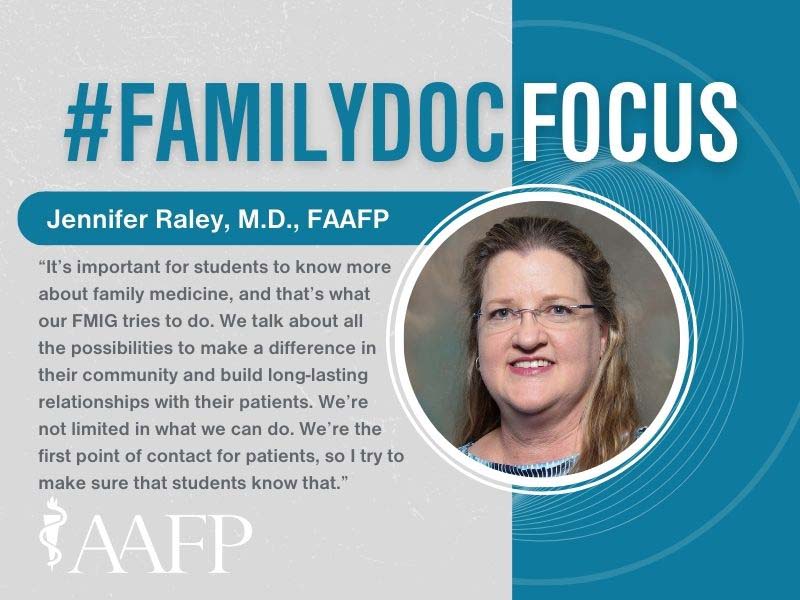Advisor Brings ‘Passion, Vision’ to Award-winning FMIG
July 3, 2024, David Mitchell — Jennifer Raley, M.D., FAAFP, never attended the National Conference of Family Medicine Residents and Medical Students as a student nor did she participate in a family medicine interest group during her studies at the University of Texas Health Science Center at Houston.

“If there was an FMIG, I didn’t know about it,” said Raley, who remained in that health system to train in its then-new family medicine residency program. “At the time there was very little presence of family medicine at UT Houston with the exception of my program director, Grant Fowler, M.D., who exemplified full-scope family medicine, particularly in the realm of procedures.”
Despite missing some opportunities as a student, Raley found her way to family medicine because of her interest in full-scope, continuous and comprehensive care. Three decades later, the FMIG advisor at the University of Texas Medical Branch in Galveston is working to ensure students who share similar passions have an easier path to the specialty.
During the Aug. 1-3 National Conference in Kansas City, Mo., the UTMB Galveston FMIG will be recognized with a Program of Excellence Award for the sixth year in a row. The school will have nearly two dozen students in attendance, so Raley can expect a loud cheering section when she accepts the Joyce Jeardeau Memorial Award, which is given to a faculty advisor or staff supporter for exemplary support of an FMIG.
“It’s important for students to know more about family medicine, and that’s what our FMIG tries to do,” Raley said. “We talk about the scope, the breadth and all the possibilities to make a difference in their community and build long-lasting relationships with their patients. We’re not limited in what we can do. We’re the first point of contact for patients, so I try to make sure that students know that.”
Raley has taught at UTMB for 30 years, including the past 25 in Galveston. In addition to clinical professor and FMIG advisor, she is the director of medical student education and co-director of the family medicine clerkship.
UTMB students nominated her for the Jeardeau Award in recognition of her “planning, detailed organization, passion, and vision for the FMIG.”
More than a dozen FMIG officers start each academic year with a retreat at Raley’s house where they begin to plan the roughly 20 events — including 12 immunization clinics and three clinical workshops — that the group will host.
“Our FMIG calendar is pretty full,” said Raley, who rarely misses an event. “We’re hosting several events every month.”
UTMB accepts about 240 medical students per class. Roughly 11% match into family medicine each year, the school’s second-highest match rate behind internal medicine.
Raley said it takes a team effort. The FMIG’s workshops on topics like women’s health, musculoskeletal and skin procedures can accommodate up to 70 students, while vaccine training sessions are capped at 40 students.
“If I didn’t have help and support from other faculty in the department and our residents and residency faculty, then we wouldn’t have the small teacher-to-learner ratios that we do,” she said. “That allows students to get individual time, not only to learn the skill but also time to interact. They can talk about what family medicine is about, what the residents and faculty like about it, what keeps them interested and what they look forward to each day.”
Raley said the FMIG is continually looking for ways to improve its existing programs, collaborate with other student organizations, and develop the innovative ideas generated at their retreat. This year, students received a free book to help them with residency interviewing and another with tips for writing their personal statement. Raley said some of those books will be given to “a few lucky students” who visit the University of Texas Family Medicine Residency booth during National Conference.
Studies have shown that a positive correlation exists between National Conference attendance and medical student choice of family medicine. UTMB will bring more than 20 students to the event in Kansas City.
“National Conference provides workshops, lectures and skills,” she said, “but it’s also about the camaraderie. You’re with other people who are thinking similarly to yourself and are very interested in family medicine and taking care of the whole person.”